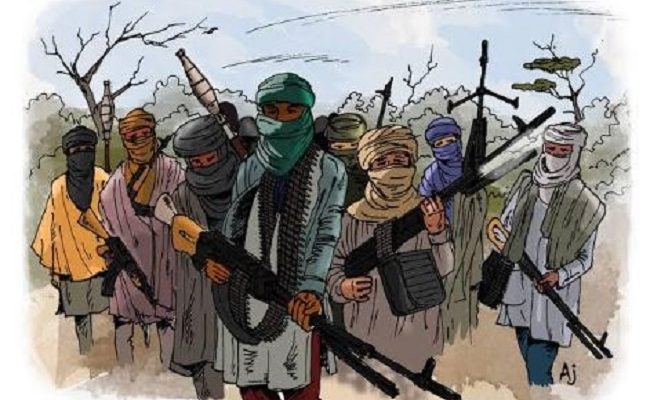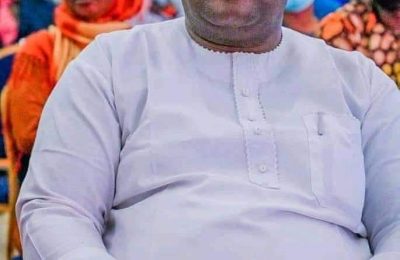The Federal Government on Monday declared that the present administration was making speedy progress in combating terrorism menace in the country with a total of 1,743 cases disposed off and 742 convictions secured in the past four years.
Director of Public Prosecution (DPP) in the office of the Attorney General of the Federation (AGF) and Minister of Justice, Abubakar Mohammed Baba Doko, disclosed this while briefing newsmen on the updates of terrorism trials at the National Counter Terrorism Centre, Office of the National Security Adviser, ONSA
He added that 888 suspected terrorists have also been discharged or acquitted by the court, while 92 cases had been adjourned within the period for further actions
According to him, “as part of the efforts of the government to ensure accountability of those that have committed crimes against the country, the Federal Ministry of Justice, in conjunction with the NCTC and other stakeholders, notably the Legal Aid Council, the Nigerian Army, the Nigerian Police, the Correctional Service, and of course the Federal High Court, came together to ensure the prosecution of suspects arrested either at the frontlines of the Northeast or the Southeast or the North Central.
“Between the year 2017 and date, a number of suspects were prosecuted at the Wawa, in Karinji. At the first phase of the trial, a total number of 282 cases were disposed of, 50 of which were convicted, 203 discharged for want of evidence, and 28 adjourned to Abuja for continuation of trial.
“At the second phase of the trial in 2018, a total number of 804 suspects or cases were disposed of, out of which 203 were convicted, 582 discharged for want of evidence, and the other cases were adjourned to Abuja for continuation of trial.
ALSO READ: Alleged terrorism: Court orders remand of suspects linked to Bello Turji
“At the third phase of the trial, between 9th to the 12th of July 2018, a total number of 224 cases were disposed of, out of which 113 were convicted, 97 discharged for want of evidence, 5 acquitted, and 9 cases adjourned for continuation of trial.
“At the fourth phase of trial, December 2023, a total number of 25 cases were listed for trial, 14 were convicted, 1 was ordered to be sent to Operation Safe Corridor for DDR rehabilitation and reintegration, and 10 cases were adjourned for continuation of trial.
At the fifth phase of the trial in July 2024, a total number of 253 cases were disposed of, out of which 125 were convicted, 85 were terrorism financing cases, 22 were International Criminal Court (ICC) criminalities, that is, crimes against humanity, and 22 were adjourned for trial.
“Now, at the sixth phase of trial, two weeks ago, December 2024, a total number of 237 cases were disposed of, about 9 were adjourned for continuation of trial.”
He further added, “Some of the cases include acts of terrorism, terrorism financing, ICC criminalities, for which some of the defendants were sentenced to terms of imprisonment.
“Now, it’s important to note that within the last one year of this administration, about 515 cases were disposed of. And over 800 clients, we call them clients, those that have served terms or were discharged or acquitted at the final stages of the trial were moved to Operation Safe Corridor for rehabilitation and reintegration in accordance with the orders of the court and the policy of the federal government.
“So all of these steps were taken in conjunction with relevant stakeholders to ensure accountability for crimes committed by violent people across the country, not just Boko Haram.”
He said the suspect kept and tried at the Wawa military cantonment in Kainji in Niger State was due to security considerations.
“Because of the high-risk nature of these suspects, they have to be kept at a dedicated holding facility in Kainji. That is also why, for public safety, security considerations, we are unable to provide specific details as to names, location, and all of the details of individuals that are either undergoing trial or have been convicted and sentenced”
Speaking earlier, the National Coordinator of the National Counter Terrorism Centre (NCTC) in the Office of the National Security Adviser (ONSA), Maj.-Gen. Adamu Garba Laka, explained that in order to ensure transparency and observation of international standards and human rights demands, the trials were held before the Federal High Court and supervised by the Office of the Director of Public Prosecutions of the Federation, Office of the Honourable Attorney General of the Federation and Minister of Justice in collaboration with the NCTC.
According to Gen Laka,“the instruments which provide the legal basis upon which persons or entities are designated terrorists and therefore subjected to the criminal investigations and prosecutions by the Nigerian Government include Constitution of the Federal Republic of Nigeria 1999 (As amended), Section 15 of the Nigeria’s Economic and Financial Crimes Act, 2004, and Terrorism (Prevention and Prohibition) Act, 2022 amongst others.
“Some of these laws identify and criminalize acts or omissions that constitute acts of terrorism and prescribe punishments accordingly while others make provision for the procedures to be followed in the administration of criminal justice within the context of terrorism.”
He said the escalation of domestic terrorist activities and the counteractions led to the arrest and detention of about 1,600 suspects in Wawa Military Cantonment, Kainji, Niger State.
According to Laka, the detention brought to the fore the urgent need to develop a comprehensive strategy on the best way to determine the culpability or otherwise of these persons suspected of being involved in terrorist activities.
“Accordingly, a team of relevant stakeholders were drawn from different MDAs to embark on the mass trial. These are Judges of the Federal High Court, prosecutors, defence counsel from Legal Aid Council of Nigeria, staff of the Office of the National Security Adviser, observers from the Nigeria Bar Association, and the press amongst others,”
ALSO READ TOP STORIES FROM NIGERIAN TRIBUNE








